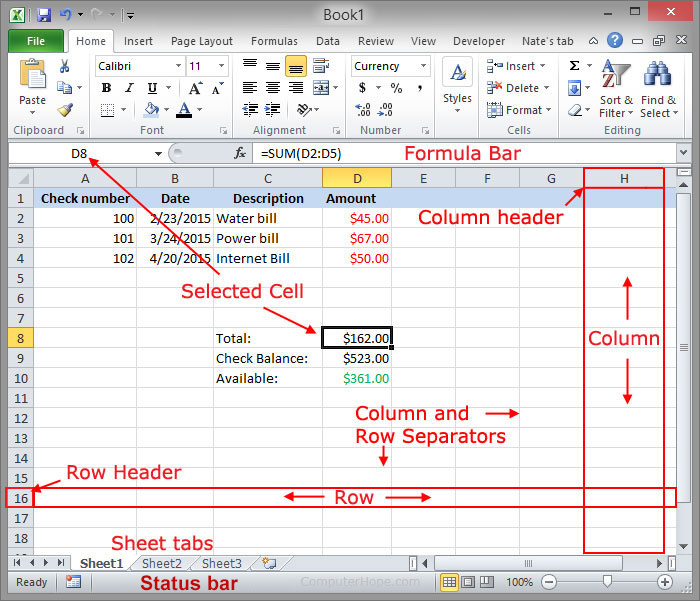How long have you been using Microsoft Excel?

Microsoft Excel focuses on making it easy for users to add in numbers to a spreadsheet. It is then a simple matter for the user to specify formulas in the spreadsheet that interact with these numbers in various ways. For example, a user might specify for Excel to add up all the numbers in a column of the program. This section includes the most popular and general terms within Microsoft Excel. The official term for an Excel file. Sheet / worksheet. A single spreadsheet within an Excel workbook. You can have essentially infinite number of sheets in a workbook. A specific location within a sheet.
Have you ever thought how Excel or the other electronic spreadsheet softwares came to existence?
In today's post, we will go back in time to trace the origin of Excel. So, here we go:
While the origin of electronic spreadsheets can be traced back to 1978, but it wasn't until 1982 when Microsoft jumped into the arena of Electronic spreadsheets with a product known as MultiPlan.
Muliplan was Microsoft's first electronic spreadsheet program. It was introduced in 1982 as a competitor for VisiCalc (the first ever electronic spreadsheet program). The key difference between Multiplan and its competitors was Microsoft's decision to use R1C1 addressing instead of the A1 addressing which was introduced by VisiCalc.
Muliplan was very popular on CP/M systems, but on MS-DOS systems it lost fame to Lotus 1-2-3. This thing motivated Microsoft to develop another spreadsheet product Excel.The first version of Excel was released in 1985 for Mac. Later in November 1987, the first Windows version was released.
It all started with VisiCalc:
In 1978, Harvard Business School student Dan Bricklin developed a program called VisiCalc. It was a relatively small program with few basic capabilities. It could only calculate data within a matrix of 5 columns by 20 rows.
To make VisiCalc more powerful Bricklin hired Bob Frankston, who is also known as the co-creator of VisiCalc. Frankston made the program fast and with better arithmetic. VisiCalc was an instant success and the duo were able to sell around 1 million copies of the program.
Note: You can still download an original copy of Visicalc from Dan Bricklin's website: http://www.bricklin.com/history/vcexecutable.htm [size: 27 K]
Definition Of Workbook
What followed VisiCalc?
After the phenomenal success of VisiCalc, a team headed by Mitch Kapor in 1983, developed a new spreadsheet program called Lotus 1-2-3. Mitch and his team power packed Lotus 1-2-3 with charting, graphing and rudimentary database capabilities along with the basic arithmetic. This made Lotus 1-2-3 a new favourite in the industry. Get adobe 9 0.

Microsoft Excel focuses on making it easy for users to add in numbers to a spreadsheet. It is then a simple matter for the user to specify formulas in the spreadsheet that interact with these numbers in various ways. For example, a user might specify for Excel to add up all the numbers in a column of the program. This section includes the most popular and general terms within Microsoft Excel. The official term for an Excel file. Sheet / worksheet. A single spreadsheet within an Excel workbook. You can have essentially infinite number of sheets in a workbook. A specific location within a sheet.
Have you ever thought how Excel or the other electronic spreadsheet softwares came to existence?
In today's post, we will go back in time to trace the origin of Excel. So, here we go:
While the origin of electronic spreadsheets can be traced back to 1978, but it wasn't until 1982 when Microsoft jumped into the arena of Electronic spreadsheets with a product known as MultiPlan.
Muliplan was Microsoft's first electronic spreadsheet program. It was introduced in 1982 as a competitor for VisiCalc (the first ever electronic spreadsheet program). The key difference between Multiplan and its competitors was Microsoft's decision to use R1C1 addressing instead of the A1 addressing which was introduced by VisiCalc.
Muliplan was very popular on CP/M systems, but on MS-DOS systems it lost fame to Lotus 1-2-3. This thing motivated Microsoft to develop another spreadsheet product Excel.The first version of Excel was released in 1985 for Mac. Later in November 1987, the first Windows version was released.
It all started with VisiCalc:
In 1978, Harvard Business School student Dan Bricklin developed a program called VisiCalc. It was a relatively small program with few basic capabilities. It could only calculate data within a matrix of 5 columns by 20 rows.
To make VisiCalc more powerful Bricklin hired Bob Frankston, who is also known as the co-creator of VisiCalc. Frankston made the program fast and with better arithmetic. VisiCalc was an instant success and the duo were able to sell around 1 million copies of the program.
Note: You can still download an original copy of Visicalc from Dan Bricklin's website: http://www.bricklin.com/history/vcexecutable.htm [size: 27 K]
Definition Of Workbook
What followed VisiCalc?
After the phenomenal success of VisiCalc, a team headed by Mitch Kapor in 1983, developed a new spreadsheet program called Lotus 1-2-3. Mitch and his team power packed Lotus 1-2-3 with charting, graphing and rudimentary database capabilities along with the basic arithmetic. This made Lotus 1-2-3 a new favourite in the industry. Get adobe 9 0.
Excel Spreadsheet Terms Definitions
Although, before this in 1982 Microsoft had already launched Muliplan but it was outshined by Lotus 1-2-3. And this thing provoked Microsoft to come up with Microsoft Excel and rest is history.
What Is The Definition Of Microsoft Excel
The Infographic on History of Microsoft Excel:
This infographic takes a closer look at the history of Excel, circa 1978-2013.
